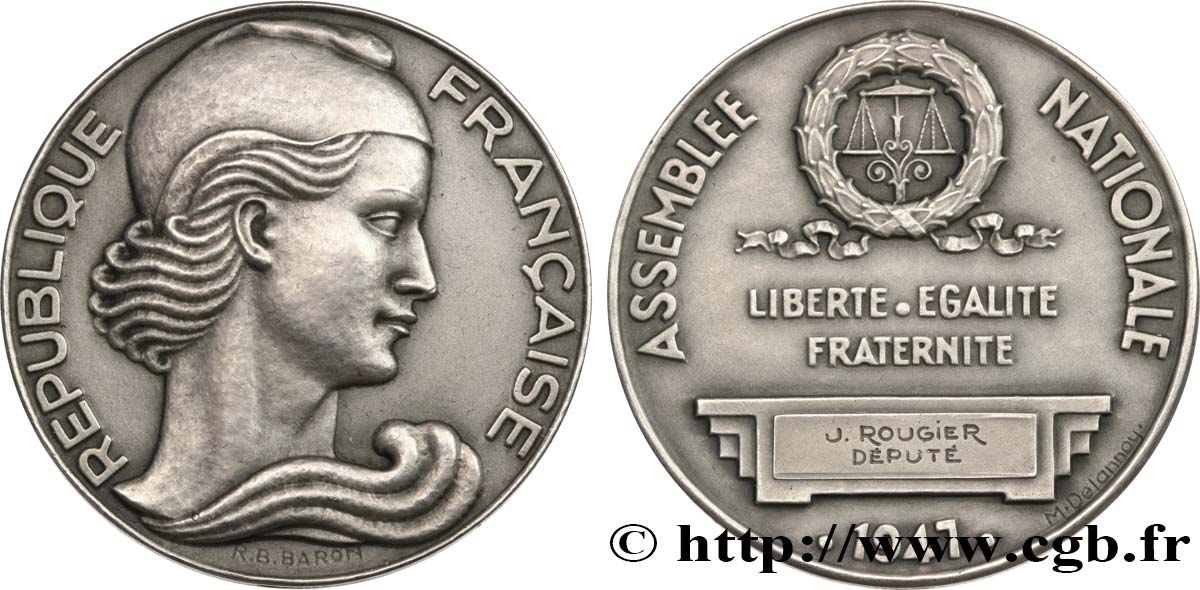fme_587216 - VIERTE FRANZOSISCHE REPUBLIK Médaille parlementaire, Jean Rougier
280.00 €
Menge
In den Warenkorb

Type : Médaille parlementaire, Jean Rougier
Datum: 1947
Name der Münzstätte / Stadt : 46 - Lot
Metall : Silber
Der Feingehalt beträgt : 950 ‰
Durchmesser : 50 mm
Stempelstellung : 12 h.
Graveur BARON Roger Bertrand (1907-1994)
Gewicht : 64,39 g.
Rand lisse + corne d’abondance 1ARGENT
Punze : corne 1ARGENT
Seltenheitsgrad : R3
Kommentare zum Erhaltungszustand:
Cette médaille présente de hauts reliefs et est recouverte d’une jolie patine grise. Petite rayure sur le joue de la République
Vorderseite
Titulatur der Vorderseite REPUBLIQUE - FRANÇAISE.
Beschreibung Vorderseite Tête de la République à droite portant un bonnet, une vague sous le cou ; au-dessous R. B. BARON.
Rückseite
Titulatur der Rückseite ASSEMBLEE - NATIONALE - .1947. // LIBERTE. EGALITE / FRATERNITE // J. ROUGIER / DEPUTE.
Beschreibung Rückseite Guirlande de laurier contenant une balance, nouée à sa base par un ruban ; signé : M. DELANNOY.
Kommentare
Médaille attribuée à Jean Rougier en tant que député. Il naquit le 2 juillet 1885 à Cahors (Lot) et décéda dans sa ville natale le 28 juillet 1952. Il y exerça en tant chirurgien. En 1925, il est élu conseiller général républicain de Luech et en 1935 conseiller municipal à Cahors. En 1973, il devient vice-président du Conseil général du Lot. Il soigna des résistants et délivra de faux certificats pour les réfractaires au STO. Il obtiendra pour ces faits la médaille de la résistance et la cravate de commandeur de la Légion d’honneur. Il fut nommé par le Gouvernement de Vichy à son Conseil national, mais fut démit immédiatement, sa femme étant israélite. Cette médaille lui fut délivrée à cette occasion. En 1945, il est réélu au Conseil général du Lot et le présida jusqu’en octobre 1951. Il fut élu député du Lot dans le courant de la Ire législature de la quatrième législature (18 octobre 1950 au 4 juillet 1951) puis fut réélu durant la IIe législature (17 juin 1951-28 juillet 1952). La ville de Cahors a donné son nom à l’Hôpital municipal.
Medal awarded to Jean Rougier as a member of parliament. He was born on July 2, 1885, in Cahors (Lot) and died in his hometown on July 28, 1952. He practiced there as a surgeon. In 1925, he was elected Republican general councilor of Luech and in 1935 municipal councilor of Cahors. In 1973, he became vice-president of the Lot General Council. He treated resistance fighters and issued false certificates for those who refused to participate in the STO. For these actions, he was awarded the Resistance Medal and the cravat of Commander of the Legion of Honor. He was appointed by the Vichy government to its National Council, but was immediately dismissed, his wife being Jewish. This medal was awarded to him on this occasion. In 1945, he was re-elected to the General Council of Lot and chaired it until October 1951. He was elected deputy of Lot during the 1st legislature of the 4th legislature (October 18, 1950 to July 4, 1951) and was then re-elected during the 2nd legislature (June 17, 1951-July 28, 1952). The city of Cahors gave his name to the Municipal Hospital
Medal awarded to Jean Rougier as a member of parliament. He was born on July 2, 1885, in Cahors (Lot) and died in his hometown on July 28, 1952. He practiced there as a surgeon. In 1925, he was elected Republican general councilor of Luech and in 1935 municipal councilor of Cahors. In 1973, he became vice-president of the Lot General Council. He treated resistance fighters and issued false certificates for those who refused to participate in the STO. For these actions, he was awarded the Resistance Medal and the cravat of Commander of the Legion of Honor. He was appointed by the Vichy government to its National Council, but was immediately dismissed, his wife being Jewish. This medal was awarded to him on this occasion. In 1945, he was re-elected to the General Council of Lot and chaired it until October 1951. He was elected deputy of Lot during the 1st legislature of the 4th legislature (October 18, 1950 to July 4, 1951) and was then re-elected during the 2nd legislature (June 17, 1951-July 28, 1952). The city of Cahors gave his name to the Municipal Hospital








 Berichten über einen Fehler
Berichten über einen Fehler Die Seite drucken
Die Seite drucken Teilen meiner Auswahl
Teilen meiner Auswahl Stellen Sie eine Frage
Stellen Sie eine Frage Einlieferung/Verkauf
Einlieferung/Verkauf
 Details
Details











